- December 10, 2020
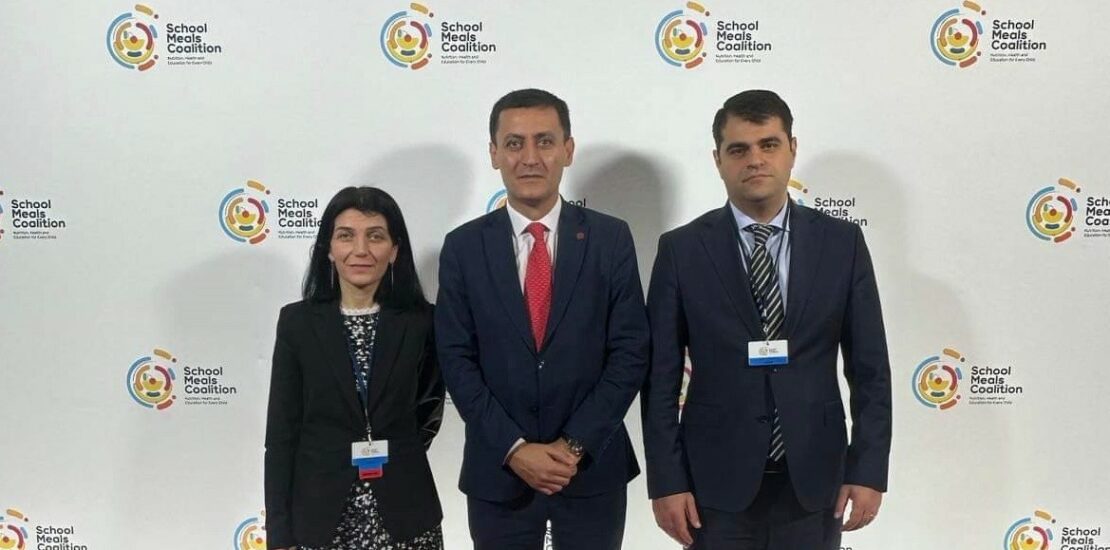
“By 2030, it is envisioned that every child worldwide will have access to school meals. On October 18-19, Paris hosted the inaugural global conference of the School Meals Coalition, uniting world leaders, experts, and stakeholders in a profound discourse on school meals. The aim was to deliberate and devise strategic measures to expand school meal programs across the globe.
The COVID-19 pandemic caused unprecedented disruption, suspending school meals for 370 million children globally. In response to these challenges, the School Meals Coalition emerged in 2021, initiated by France and Finland with support from the UN World Food Program. Its primary goal is to reinstate, bridge the gaps, and revolutionize school feeding programs, ensuring that every child worldwide has access to school meals by 2030.”
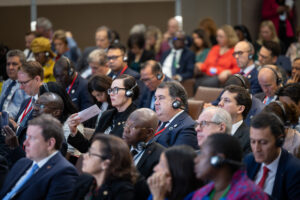
“The inaugural conference, conducted under the patronage of French President Emmanuel Macron, marked a groundbreaking event, forging crucial connections between nutrition, education, and health while fortifying existing ties. Themed ‘Investment in future generations: Human capital, sustainable food systems, and climate change action through school meals,’ the conference convened representatives from 90 countries in Paris. The gathering served as a platform to deliberate upon innovative solutions in the realm of school meals, fostering commitment and collaborative action toward realizing the Coalition’s overarching vision.”
“With support from the UN World Food Program, Armenia participated in this esteemed event, underscoring its dedication to the ongoing development and expansion of the ‘School Feeding’ program. The Armenian delegation was led by Artur Martirosyan, Deputy Minister of Education, Science, Culture, and Sports of the Republic of Armenia, accompanied by Mrs. Satenik Mkrtchyan, Director of the “School Feeding and Child Welfare” Agency under the National Center for Education Development and Innovation Foundation.
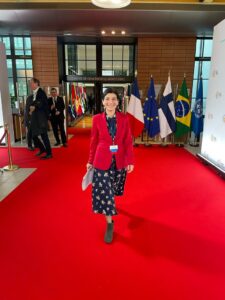
“Uniting Goals through Diverse Strategies: Conference Panel Discussions”
Speakers from various countries shared their national commitments and successes concerning school feeding programs. Each narrative was distinct, emphasizing the significance of tailored actions and political determination of the countries. However, these narratives shared a common thread: the collective aim to afford children the chance to access nutritious meals at school.
The conference agenda comprehensively covered diverse perspectives on school food, spanning from policy formulation and program implementation to innovation and global collaboration. Across the two days of plenary sessions, the conference diligently addressed a spectrum of pivotal topics, ensuring a holistic exploration of the subject matter.”
“From Promises to Progress: Armenia”
The session titled “From Promises to Progress: National Commitments in Action” provided a platform for countries to showcase remarkable strides in program development. The speakers, including Armenia represented by Artur Martirosyan, Deputy Minister of the Ministry of Education, Science, Culture, and Sports, underscored their national obligations. They briefly presented ongoing programs in their respective countries and underscored key priorities for the near future.
“From Global to Regional”
“From Global to Regional: The Coalition and its emerging regional networks” plenary session shed light on the dynamics of regional school food developments, identified priorities, and emphasized the importance of sharing experiences and knowledge with partners to address specific country needs and challenges within the context of actions.”
“Innovative Financing Solutions”
“What collective efforts will drive global progress in financing school meals in low-income countries by 2030? “Closing the Funding Gap: Innovative Solutions for Financing School Meals,” a key session, aimed to address this very question. The discussion centered on innovative financing mechanisms, including debt swaps and leveraging through the multilateral system, among others.”
Beyond Lunch
“Beyond Lunch: School Meals for a More Equal and Inclusive Future” was a discussion where participants highlighted the profound societal and educational impacts of school meal programs. It was emphasized that these initiatives extend beyond addressing hunger; they play a crucial role in enhancing equity, fostering inclusion, and improving educational outcomes. Supported by empirical evidence, these programs encourage family engagement in a child’s nutritional well-being, diminish gender-based disparities in society, and cultivate an environment where every child, especially in conflict-affected areas, can access educational opportunities and holistic development.
“Armenia at the Conference”
Deputy Minister of Education, Science, Culture, and Sports, Artur Martirosyan, participated in the plenary discussion titled “From Promises to Progress: National Commitments in Action.” This session, held within the framework of the School Meals Coalition, featured various sector officials from member countries sharing insights on program implementation, achievements, and prospects in their respective nations.
During the discussion, Martirosyan presented Armenia’s commitment to join the coalition and detailed the implementation process of the RA’s “School Feeding” program. As of July 2023, the UN World Food Program (WFP) has completely handed over the management and implementation of the “School Feeding ” program to the RA government, which now receives full funding from the state budget.
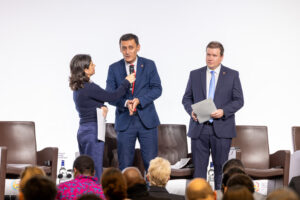
The inception of the project in Armenia dates back to 2014, supported by the UN World Food Program, technical aid from the Social and Industrial Foodservice Institute (SIFI), and financial backing from the Russian government. Over the years, the project’s management and financing have been gradually transitioned to the RA government in phases.
According to the deputy minister, from January 2023, more than 100,000 children in grades 1 to 4 in 1075 schools in 10 marzes of RA receive food at the expense of the state budget. He told his colleagues about the success of the “School Feeding” program in Armenia, stressing that the most important thing is the continuous improvement of the program, the spread of knowledge about healthy food, parallel to the component of the program itself, and providing children with food.
– One fact is important. From September 2023, the cooks included in the schools, mostly chosen from the communities, who were paid this symbolic amount before, have been included in the staff list of the schools and receive the corresponding salary, Martirosyan informed.
The Deputy Minister of the Ministry of Education, Science, Culture, and Sports also highlighted the establishment of the “School Feeding and Child Welfare” Agency, designed to support the government in the smooth operation of the program.
“The program’s adaptability was tested in a real crisis,” he emphasized. “Following the military aggression unleashed by Azerbaijan on September 19, 2023, 21 thousand citizens forcibly displaced from Nagorno-Karabakh are school-age children. They have seamlessly integrated into Armenia’s educational program. Two-thirds of these children attend elementary school, ensuring they have the same access to healthy meals at school as other Armenian children.”
Martirosyan also highlighted that despite the program’s complete nationalization, the UN World Food Program remains a crucial partner due to its ambitious developmental objectives.
“By 2030, we aim to encompass the schools in the capital city of Yerevan within the program, enabling an additional 50 thousand children to access healthy meals at school. This inclusion will cover primary classes across all schools in the Republic of Armenia.
The program’s second significant objective is to establish opportunities for middle and high school students to access meals at school through innovative co-financing models.”
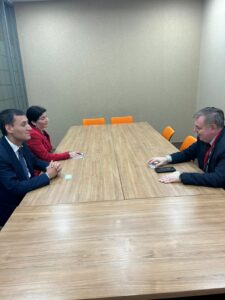
“What Did Armenia Gain from the Conference?”
Satenik Mkrtchyan, Director of the “School Feeding and Child Welfare” Agency, describes the conference as an unparalleled platform that brought together the global school food community. Representatives from various countries, spanning decades of experience in the field, alongside newcomers taking their initial steps, assembled at this unprecedented gathering. It fostered an exceptional atmosphere, instilling motivation among attendees to further the program. The prevailing sense was one of hope, determination, and a collective commitment to develop and expand school feeding programs.
“The conference was truly unique. Individuals who recognize the significance of school food and actively work in this realm congregated from across the globe. We had the chance to witness the diverse countries, partners, financial models, and political approaches that form the global landscape of school meals,” says Satenik Mkrtchyan. “Most importantly, we gained clarity on Armenia’s position within this landscape. It became evident that Armenia’s ‘School Feeding’ program has made remarkable strides; it’s evolved beyond being merely a social initiative. Instead, it stands as an educational platform with a focus on health and community development.”
The Armenian delegation conducted several significant meetings with various participating organizations during the event and came back to Armenia with impressive proposals for future collaborations. Mrs. Mkrtchyan emphasizes the meeting with Daniel Balaban, Director of the World Food Program Center of Excellence against Hunger in Brazil, aimed at exploring collaboration opportunities with the center. Following the meeting, ongoing discussions with Balaban persist on a virtual platform.”
“In our collaboration with this organization, we must enhance urban school food models, leverage educational resources through school gardens and greenhouses, and integrate small agricultural farms into the program,” says Satenik Mkrtchyan.
“The meeting with the Milan Urban Food Policy Pact was highly productive. We discussed potential collaborations between Milan and Yerevan, exploring the prospect of Yerevan joining the Milan Pact.”
Milan Urban Food Policy Pact (MUFPP) is an international protocol targeting the global challenges within urban food systems. The pact was formally inaugurated on October 15, 2015, during Expo Milan 2015 during which it garnered signatures from mayors and representatives of over 100 cities worldwide. Presently, 260 cities have endorsed the pact, collectively representing more than 460 million individuals across 6 continents.
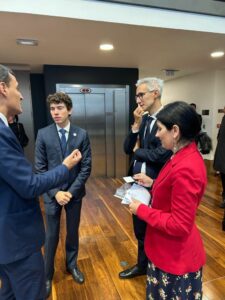
The “School Feeding and Child Welfare” Agency has recommended Yerevan city’s membership in the Milan Urban Food Policy Pact to the Minister of Education, Science, Culture, and Sports of the Republic of Armenia, Zhanna Andreasyan. Participation in this platform would grant Yerevan, and Armenia at large, access to a global stage for sharing knowledge and best practices in managing urban food systems. It facilitates integration into established international school feeding systems and enhances community capabilities in organizing public food initiatives.
Joining the Pact would enable Yerevan to collaborate with international experts in urban food project implementations, adopt innovative frameworks for policy development, and address various pertinent issues. Additionally, becoming a member could attract potential international funding and technical support, fostering local agricultural initiatives, enhancing food security, and strengthening community capacities within urban food systems. This includes communication of innovative and successful practices in school and pre-school nutrition.
The Ministry has already agreed to join the Pact and has forwarded the proposal to Yerevan Municipality. Currently, the “School Feeding and Child Welfare” Agency is aiding the municipality in the preparations to join the Milan Pact.
Another pivotal meeting was conducted with Donald Bundy, Head of the Research Consortium for School Health and Nutrition, to explore potential collaboration between Armenia and the Consortium. Bundy expressed their eagerness to engage, highlighting that our institution has offered significant avenues for participation in joint research and projects. Clarification of subsequent steps for active involvement is essential following the Foundation’s co-responsible letter.

․․․․․․․
Discussions at the School Meals Coalition’s inaugural conference encompassed success stories, opportunity mapping, and a clear vision for a future where hunger is eradicated through collective efforts, ensuring universal accessibility to education. The conference highlighted the significance of everyone’s contribution to this global cause, emphasizing that each individual, from policymakers to managers to chefs, is not merely a participant but a co-creator within school meal programs. These collective efforts aim to ensure every child receives nourishment, education, and readiness to thrive in a rapidly evolving world.
The inaugural conference has concluded, marking the beginning of a reality. The platform’s subsequent meeting, connecting diverse regions worldwide, is scheduled two years hence, set to take place in sunny Brazil.
